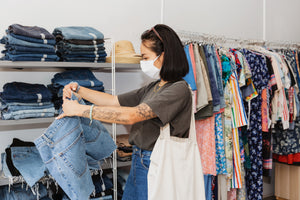
KIRRAsks: Chef Peggy Chan
Right before we kickstart our GreenPass initiative, we've interviewed Chef Peggy Chan, a prominent chef behind Grassroots Initiatives and the nonprofit organization, Zero Foodprint Asia that seeks to help our local farmers as we eat our way out of the climate crisis. Let's get to know her, learn from her very insightful thoughts, and her advocacy to save our planet. Let's explore how she makes change, one bite at a time.

My first F&B gig was at the first Starbucks ever opened in HK in year 2000. I was 16 then, angry at the world and living practically alone, so working gave me a sense of self-resiliency, independence, and it was also when I realized how repetitive movements gained at work helped to create better structure in my life. Working the same hand and feet movements over and over again was meditative to me.
2. What is your food philosophy?
Health is wealth. So let food be the medicine.
3. Where do you get the inspirations for all your delicious dishes?
Everywhere. Sometimes it could be a memory I had as a child, like cooking Vietnamese Yellow Curry with my mother where I remembered accidentally cutting a part of my finger off when trying to separate the chicken wings, and that inspired me to create a veganized version of the dish. Sometimes it could be from my travels (which I have missed tremendously) to places I have never been to alone, like spending a week with Berbers in the Atlas Mountains in Morocco, or meditating and browsing the open air food markets in Laos.
The fresh ingredients and the smells inspire me to re-create dishes unknown. Then finally, I'm hugely inspired by utilizing food to tell the stories of those whose voices aren't often heard - the farmers, the animals and our planet. So my food is designed in such a way that helps communicate the need for food sovereignty and climate action.

4. What do you think about the sustainability trend in Hong Kong’s F&B industry today?
The weekly climate disaster news read from around the world should be alarming enough to recognize that sustainability is no longer 'just a trend'. It's a necessity. Everybody needs to get involved and every day should be a day for climate action. Sadly in HK we are so far removed from the sufferings of others around the world. Where 97%+ of the food we consume is grown by some other farmer controlled by a food system that degrades soil, harms human health and destroys biodiversity. We don't tend to see this as our responsibility enough and that's where I believe we're missing the mark entirely. Sure, switching out single-use plastic and serving more plant-based dishes are incredibly important. But is it creating a dent and making a long term shift yet? Not in the least slightly. That's because the current economic system doesn't allow for us to do the right thing easily and doing the right thing will generally costs more, deterring people from becoming more 'sustainable'.
Honestly, I think we're too late to be talking about 'best practices' as they should have been done 10-15 years ago, and the systems should have been set in place 10-15 years ago so that becoming more 'sustainable' nowadays shouldn't be used as a marketing gimmick, but a necessity. Climate change is happening right in front of us (hello 35 degrees in October??!). and what this means is not only will it affect us on the surface (climate disasters us as floods, droughts, harsh winters/summers, bigger storms) but more importantly, it will hugely affect our ability to grow food.
5. What motivated you to start Zero Foodprint Asia?
So a good segway into what kind of solutions are out there... several years ago I attended a conference in Copenhagen where I learnt about Project Drawdown - 100 solutions to reverse global warming. 15 out of the top 20 most impactful solutions has to do with food, land use and agriculture. And those solutions are mainly nature-based solutions, and they are already out there! Designed for free, by nature! And so regenerative farming is where it's at.

We know that organic farming trumps conventional industrial farming, but still organic standards have been tainted and reduced over the years and you'd be hard-pressed to know that after what, 60 years of the organic movement, only 2% of the world's farms are 'certified' organic.
This again, is to do with the system - where GMOs are not required to be labelled, but attaining an ORGANIC certification is required to be paid for annually by the farmer themselves. Regenerative farming is essentially permaculture - growing food that prioritizes soil health, land and carbon sinks preservation, restoring biodiversity, honouring farmers livelihoods and simply, growing food the way that nature intended us to. But above what permaculture declares, is the science behind regenerative farming. We now know from studies and papers done across the scientific field is that regenerative farming practices such as no tilling, cover-cropping, mulching, interplanting, composting and managed grazing; not only restores soil health, grow more nutritious food, are more climate resilient, but ALSO, healthier soil helps to drawdown and store bad carbon (what's causing climate change) from the atmosphere.
For someone who has absolutely no knowledge about how food is grown, those practices above may make no sense at all. But basically, they are practices that are in complete opposite to industrial agriculture - heavy tillage, use of chemical fertilizers and pesticides, mono-cropping, keeping soil bare, controlling and squeezing farmers, and destroying natural land sinks (Amazon rainforest) to grow monocrops used to feed cattle. So guess what, industrial agriculture is subsidized (by governments pressured by lobbyists), regenerative is not.
Zero Foodprint flips this by asking 1% of every diners' purchase to fund regenerative agriculture so that we can help farmers grow better food while storing carbon in the soil. It's a win-win-win situation.

6. What mission are you trying to achieve with your initiatives
Zero Foodprint now has 4 separate arms - one in California, one for Nordic countries, one for Deutschland, and ourselves for Asia (starting with HK). HK has the highest density of restaurants per capita in the world and everyone eats out at least once a day, almost daily. 1% of a $37 flat white is 37 cents, and 1% of an $1800 fine dining meal is $18. The barrier for each diner and each restaurant to participate is SO low that it would almost be cheap to not prioritize our dollars going to the right places that funds the restoration of our planet for future generations. We know we can't solve climate change alone and hence the more people we bring on board, the larger the impact we can then create.
In California where regenerative farming has been successful for the past 5-8 years, the knowledge is just beginning to filter through to everyday laymen like myself now. Just this past year they have raised over USD550,000, granted across 31 farming projects estimated to draw down 18,000 tonnes of carbon dioxide from the atmosphere. This equates to the GHG emissions derived from 4000 passenger vehicles driven for one year.
We are piloting 2 farms here in HK to help the farmers apply regenerative practices on their farms, so that studies on soil health, nutrient increase in foods, and the calculation for carbon sequestration potentials can begin in our parts of the world.
Education is a huge piece of this movement and we need to educate more farmers, incentivize young farmers towards regenerative farming. Restaurants who are participating as a 1% partner also want to source directly from HK farmers, so we help bridge this link with a side program called "Adopt a Farmer", where we match a farmer to a chef for a period of 12 months so that they can start to communicate, ask questions, get involved with the growing season in HK, plan menus ahead of time etc.
Very few people realize that Chefs in HK have no clue what is available seasonally here in HK, because we've always been told to just pick up the phone, order anything from Japan, or France, or Australia, and they magically arrive tomorrow. This convenience has exacerbated many of our food systems problems so this program aims to humanize the reason for why we should all know the names of those who grow our food.
All in all, ZFPA was founded by restaurant people and is led by restaurant people. We're practical, good hustlers, care deeply about our customers, our colleagues, and on top of that, we also care very much about the health of our planet.
We know chefs and restaurateurs are extremely busy people and rarely have the time to spend on best practices unless you can tell them that the alternative option is i) cheaper ii) quality is better, iii) easily accessible and add to that a bonus iv) more 'sustainable'. ZFPA makes participating a low barrier to entry, and works to mobilize a movement working for climate action together.

7. What other NGOs are you a part of?
Chefs' Manifesto - a network facilitated by the SDG2 Advocacy Hub where we believe chefs can be powerful advocates for a better food future – inspiring people to make changes in their kitchens and communities and empowering them to call on governments and companies to also play their part. I've actually been invited to cook at the Dubai Expo for a Ministerial dinner in January, where I will use my storytelling through food to inspire policy changes and co-create agendas towards a more regenerative food system.
8. Three words that describe you.
Creative, scrupulous and resilient.
9. Your favorite quote.
"Everyday's act of eating is an act of creating freedom." - Dr. Vandana Shiva (a leader in the farmers' rights movement who inspired me to get into this work in the early-mid 2000s)
10. Can you say a few words about Green Pass?
Every meal is an opportunity to vote for what is right. Put your dollars where your mouth is, consume less meat, support local, choose whole plant-based ingredients, support Green Pass restaurants, support ZFPA partner restaurants, and let's work together to create a renewable food future!






Leave a comment